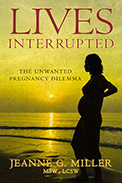
 |
Jeanne G. Miller's credentials and psychotherapist background, particularly with patients who have had to make the unenviable decision of deciding for or against abortion, speak for themselves. The masterpiece that is Lives Interrupted is perhaps the most thorough, unbiased, and impartial literature on arguably the most controversial societal issue. With clarity and force, Miller's presentation of the unwanted pregnancy dilemma is balanced: historical encounters begin the text, first-hand interviews end it, and the middle is imbued with captivating statistics, references to prominent abortion literature, and ultimately a deluge of knowledge on abortion.
At the beginning of every chapter, there is a famous quote pertaining to abortion. Chapter 1 is a Dr. Seuss quote that, albeit simple, conveys a powerful concept: "A person's a person, no matter how small." In this chapter, Miller profiles her own mother and gives readers a strong idea of how social stigma adds enormous pressure on the individual to choose between her unborn child and a normal life in the eyes of society. Despite being a byproduct of an unwanted pregnancy herself, she is ever grateful to her birth mother for bringing her into the world. Miller discusses the types of women that find themselves in this predicament, and provides a host of statistics that shed light on the evolution of abortion—and how it was perceived—overtime. Nevertheless, the crux of Miller's argument can be simplified into one question: Why does everyone have a say in the fate of the individual's life except the individual himself?
From a lack of survival resources to a desire to eliminate "defective" offspring from entering society, primitive generations often used abortion as a means to an end. The mindset on unwanted pregnancies improved by the 19th century; it went from the preferred method, to a last resort. Countless illustrious, transformative figures, including, but not limited to George Washington, Thomas Edison, Helen Keller, and Albert Einstein may not have had the opportunity to make their contributions if their minor defects at birth led their parents to abort.
In the advanced era of the 21st century, numerous methods exist to avert the abortion dilemma altogether. In fact, Miller argues that unwanted pregnancies—with the exception of rape—occurring despite the many preventative measures are simply irresponsible. Interestingly she delves into the socioeconomic, educational, ethnic, and religious stereotypes that are often unthinkingly applied to such circumstances. Needless to say, the statistics and evidence provided in this text shatter these stereotypes and present some surprising results.
The review of literature amassed in this book is undoubtedly comprehensive. Books such as Real Women, Real Choices and prominent medical practitioners and researchers contend that the infant in the womb feels the same degree of pain that is felt by a born infant. Aside from damage to the fetus, there is an undeniable threat to the female, who runs the risk of bleeding to death, cervical cancer, and more.
Lives Interrupted has the content of a well researched paper; however, the smooth flowing sentences and engaging interviews give the piece a largely narrative feel. Readers will be mesmerized by how simply and clearly Miller conveys such a controversial topic. Instead of arguing only one side, Miller thoroughly examines the psychological, medical, and spiritual elements of justifying an abortion. Proving that abortions are unjustified would be rather simple based on the body of evidence and professional references. On the contrary, the author supplies her readership with a collection of interviews from both individuals who regretted the abortion and individuals who were mostly unfazed. Additionally, an extensive list of symptoms of post-abortion syndrome helps readers understand the consequences of abortion in depth.
A decision as critical as an abortion will certainly be made in crisis. Miller fully understands this, but points out that after assessing all the angles of the decision, can one truly justify abortion? Legislations such as Roe v. Wade and numerous pro-life versus pro-choice debates have implanted themselves in society for decades. Lives Interrupted is a surefire must read. Taking it one step further, this text belongs in the curriculum of all social science classes. There is little doubt that anyone, anywhere, will benefit greatly from reading this book and will gain a more complete understanding of why people resort to abortion and why it is, with few exceptions (e.g., rape), completely unnecessary in today's society.
RECOMMENDED by the US Review